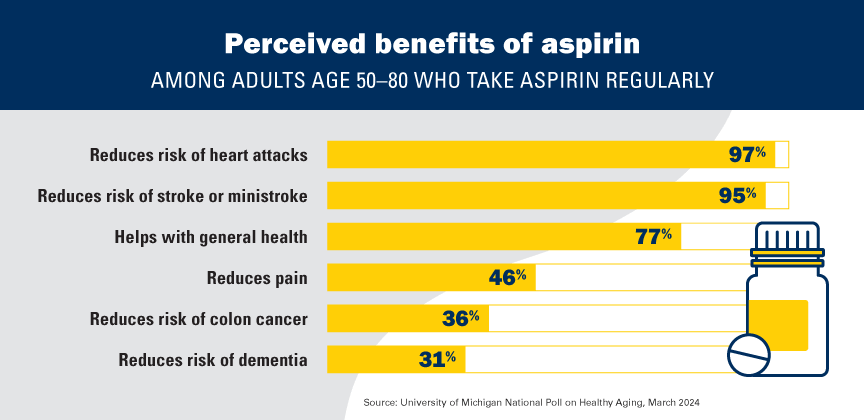ANN ARBOR, Mich. — Do older adults need to take an aspirin a day to prevent heart disease? Not necessarily, according to a new University of Michigan survey. One in four individuals 50 to 80 years-old takes aspirin at least three times a week, predominantly to prevent heart attacks and strokes. However, the findings suggest that many of these older adults might not need to take aspirin as a preventive measure, particularly if they do not have a history of cardiovascular disease.
The University of Michigan National Poll on Healthy Aging, which reflects responses from a national sample of adults in the 50-80 age group, reveals that 57 percent of regular aspirin users do not have a history of cardiovascular disease. This is noteworthy because national guidelines on aspirin use have evolved, now recommending aspirin primarily for individuals with a history of cardiovascular disease or those at high risk due to personal and family health history.
Surprisingly, 14 percent of older adults are taking aspirin without any history of heart issues. Aspirin, while beneficial for some, poses a risk of bleeding, especially in older adults. Current guidelines advise caution with routine aspirin use beyond age 70, and in some cases, suggest considering stopping its use around age 75 for those without cardiovascular disease.
The poll also uncovered a gap in awareness, with 31 percent of older adults taking aspirin unaware of its associated bleeding risks. This calls for increased communication between health care providers and patients regarding the benefits and risks of aspirin, particularly as 71 percent of older adults who take aspirin began doing so four or more years ago, potentially based on outdated advice.
“Aspirin is no longer a one-size-fits-all preventive tool for older adults, which for decades it was touted as,” says Dr. Jordan Schaefer, a hematologist at Michigan Medicine who worked with the poll team, in a university release. “This poll shows we have a long way to go to make sure aspirin use is consistent with current knowledge.”

Experts note that preventive aspirin use should consider a person’s age, family history, past health issues, current medications, recent test results, and lifestyle factors.
The American College of Cardiology and American Heart Association’s 2019 guideline suggests that daily low-dose aspirin use may be considered for preventing cardiovascular disease in select adults between 40 and 70 years-old who are at increased risk but not at risk for bleeding. Conversely, the U.S. Preventive Services Task Force updated its guideline in 2022, advising against initiating aspirin for cardiovascular disease prevention in adults 60 and older.
This nuanced approach to aspirin use underscores the importance of dialogue between health care providers and patients, ensuring decisions are informed by the latest guidelines and an individual’s specific health profile. The poll’s findings highlight the need for older adults to discuss their aspirin use with their healthcare providers, particularly those without a cardiovascular disease history or those who initiated aspirin use independently or on the advice of friends and family.
“Thanks to updated knowledge, and reductions in other major risk factors such as smoking, we can use aspirin more precisely, focusing on those who need this inexpensive and easy-to-obtain preventive medication most and avoiding unnecessary risks for others,” explains poll director Dr. Jeffrey Kullgren, primary care physician at the VA Ann Arbor Healthcare System and associate professor of internal medicine at University of Michigan. “These poll findings should spur more conversations between health care providers and patients about what’s right for them.”
The poll received support from AARP and Michigan Medicine.
Methodology
The poll report is based on findings from a nationally representative survey conducted by NORC at the University of Chicago for Institute for Healthcare Policy and Innovation at the University of Michigan and administered online and via phone in July and August 2023 among 2,657 adults aged 50 to 80, with an oversample of non-Hispanic Black and Hispanic populations. The sample was subsequently weighted to reflect the U.S. population.
